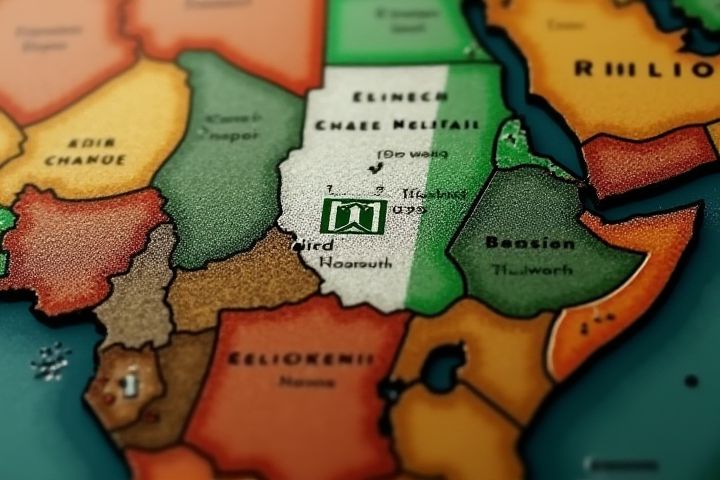
Nigeria is indeed located in Sub-Saharan Africa, occupying a significant position as the continent's most populous country. It shares borders with Benin to the west, Niger to the north, Chad to the northeast, and Cameroon to the southeast. The country boasts diverse ecosystems, including savannas, rainforests, and wetlands, contributing to its rich biodiversity. With a vibrant culture that includes over 250 ethnic groups, Nigeria is known for its cultural festivals, music, and art. Your exploration of Nigeria can unveil its bustling cities, such as Lagos and Abuja, which serve as economic and political hubs within the region.
Geographical Location
Nigeria is situated in West Africa, bordered by Benin to the west, Niger to the north, Chad to the northeast, and Cameroon to the southeast. It lies along the Gulf of Guinea, with a coastline that stretches approximately 853 kilometers. As the largest country in the region, Nigeria covers an area of about 923,769 square kilometers, making it a significant landmass in Sub-Saharan Africa. Its geographical diversity includes savannas, mangroves, and dense rainforests, contributing to its rich biodiversity and varied ecosystems.
Economic Status
Nigeria, located in Sub-Saharan Africa, is the continent's largest economy, primarily driven by its oil and gas sector, which constitutes a significant portion of its GDP. Despite this wealth in natural resources, the country faces challenges such as high unemployment rates and poverty, affecting a large segment of its population. The agricultural sector also plays a crucial role, providing employment and contributing to food security, yet it remains underdeveloped compared to its oil revenues. Your understanding of Nigeria's economic status would benefit from recognizing the efforts aimed at diversifying its economy, targeting sectors like technology and agriculture for sustainable growth.
Population Size
Nigeria, located in Sub-Saharan Africa, is the most populous country on the continent, with an estimated population exceeding 223 million as of 2023. This diverse nation is composed of over 250 ethnic groups, each contributing to its rich cultural tapestry. The rapid population growth rate, around 2.6% annually, poses significant challenges and opportunities for economic development, infrastructure, and social services. You can observe how demographic dynamics in Nigeria impact regional stability, labor markets, and urbanization trends across Sub-Saharan Africa.
Diverse Cultures
Nigeria, located in Sub-Saharan Africa, is a vibrant mosaic of cultures, ethnicities, and traditions. Home to over 250 ethnic groups, including the Yoruba, Igbo, and Hausa-Fulani, Nigeria showcases an impressive range of languages, arts, and customs. You can experience stunning festivals, traditional music, and exquisite cuisine that reflect the rich heritage and communal values of its people. The country's cultural diversity not only fosters a unique national identity but also contributes to its economic activities through tourism and hospitality.
Political System
Nigeria, situated in Sub-Saharan Africa, operates under a federal system of government characterized by a presidential democracy. The political structure consists of three branches: the executive, led by the President, the legislative, composed of the National Assembly, and the judiciary, ensuring checks and balances. Nigeria's political landscape is marked by a multi-party system, with key parties including the All Progressives Congress (APC) and the People's Democratic Party (PDP). Frequent electoral contests and a robust civil society actively engage citizens in shaping policies and governance, reflecting the diverse cultural and ethnic tapestry of the nation.
Natural Resources
Nigeria, located in Sub-Saharan Africa, is rich in natural resources, making it one of the continent's largest economies. The country is a significant producer of petroleum, which accounts for a substantial portion of its GDP and export revenues. Alongside oil, Nigeria is endowed with vast reserves of natural gas, minerals like tin, limestone, and coal, as well as agricultural resources such as cocoa and palm oil. This diverse resource base presents both opportunities for economic growth and challenges related to sustainable management and environmental impact.
Regional Influence
Nigeria is the largest country in Sub-Saharan Africa, both in terms of population and economy, significantly influencing regional dynamics. With a diverse array of ethnic groups and languages, Nigeria plays a pivotal role in fostering regional cooperation and cultural exchange. Its economy, driven by oil and gas production, shapes trade relationships within the Economic Community of West African States (ECOWAS). You can observe Nigeria's influence in peacekeeping efforts and diplomatic initiatives aimed at stabilizing neighboring countries facing conflict or political unrest.
Language Diversity
Nigeria, located in Sub-Saharan Africa, boasts one of the highest levels of language diversity in the world, with over 520 distinct languages spoken. This linguistic variety reflects the rich cultural tapestry of the country, where major languages such as Hausa, Yoruba, and Igbo coexist alongside numerous regional dialects. Each language carries unique traditions, folklore, and identity, contributing to Nigeria's vibrant cultural landscape. For anyone exploring Nigeria, understanding its linguistic diversity is essential to appreciate the depth of its heritage and social dynamics.
Historical Significance
Nigeria, located in West Africa, holds immense historical significance as one of the continent's most populous countries. It is home to diverse ethnic groups, including the Hausa, Yoruba, and Igbo, each contributing to Nigeria's rich tapestry of culture and history. The region was a center for ancient civilizations, such as the Nok culture and the empires of Kanem-Bornu and Oyo, which thrived in trade and governance long before colonization. The discovery of oil in the 20th century transformed Nigeria's economy, making it a key player in the global oil market, while its struggles with colonization and subsequent independence in 1960 highlight the nation's resilience and complexity in the face of historical challenges.
Societal Challenges
Nigeria, located in Sub-Saharan Africa, faces numerous societal challenges that impact its development and stability. High levels of poverty affect a significant portion of the population, exacerbating issues like inadequate access to education and healthcare. Ethnic and religious tensions contribute to conflicts, particularly in regions like the North East, where insurgencies have disrupted communities. Urbanization and population growth further strain infrastructure and resources, leading to overcrowding, unemployment, and increased crime rates, which necessitate urgent policy interventions.
